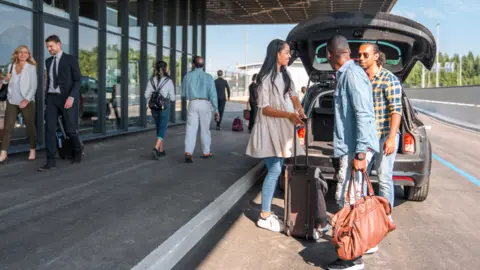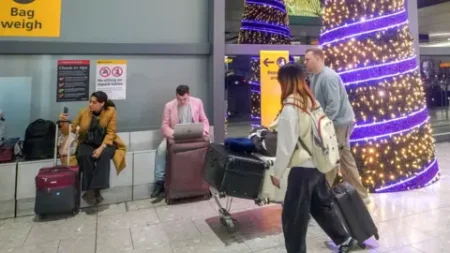In a recent announcement, the RAC (Royal Automobile Club) reported a significant increase in “kiss-and-fly” fees at major airports across the United Kingdom. This research indicates that over half of the busiest airports in the country have raised prices for short-term drop-offs, prompting concerns among travelers about the rising costs associated with airport access. These fees apply to cars dropping off passengers closer to terminals, where convenience is priced at a premium.
The RAC’s findings highlight that 11 out of the top 20 airports in the UK have raised drop-off prices since July of the previous year. Notable airports such as Gatwick, Bristol, Leeds Bradford, Southampton, and Stansted have all adopted a maximum fee of £7 for merely a few minutes of parking time. This trend contrasts sharply with the situation in the European Union, where nine of the ten busiest airports do not charge any fees for drop-off services. The difference in policy could raise questions about the necessity and fairness of such charges in the UK.
Airports UK, the organization that represents the interests of the airport industry, claims that while drop-off fees have increased, all airports offer alternatives for free drop-off further from terminals. These options typically include “park and ride” facilities, where passengers can leave their vehicles and take buses to the airport, alleviating congestion at terminal entrances. However, these solutions may not always suit travelers who require quick access to terminals for a smooth drop-off experience.
Research further elucidates the price adjustments individual airports have implemented. For instance, major airports including London Heathrow, Edinburgh, Birmingham, and Liverpool have all seen a rise in their fees by approximately £1, bringing the charge for a 10 to 20-minute drop-off to around £6. Meanwhile, Cardiff Airport has introduced its first drop-off fee, requesting £3 for the use of this service over a 10-minute period. Luton and Manchester airports have distinguished themselves by being the most expensive on a cost-per-minute basis, with a shocking figure of £5 for a mere five-minute stop.
Rod Dennis, a senior policy official at the RAC, pointed out the underlying issues associated with these increasing fees. He noted that drivers are often left with no choice but to pay these charges due to the lack of convenient alternatives, deeming the £7 fee for such a short stop excessive. Dennis expressed concerns that these continuous price hikes are likely to frustrate those dropping off loved ones during the busy summer travel season.
Furthermore, the survey covered various European airports, revealing that hubs such as Frankfurt and Paris Charles de Gaulle do not impose any charges for quick drop-offs. The only exception identified was Schipol airport in the Netherlands, which charges €2.50 (approximately £2.17) for similar services. Karen Dee, the chief executive of Airports UK, commented that fees are essential for managing congestion, mitigating noise pollution, and decreasing carbon emissions—obligations that airports face from both local authorities and government entities. The reasoning behind the fees is tied to the sustainability of airport operations, which, it is suggested, support a broader array of flight options.
Interestingly, London City Airport is the only recognized airport on the list that does not impose any drop-off fees, suggesting a different operational strategy in its business model. Airports like Gatwick have defended their pricing policies by mentioning the importance of such charges in solving congestion problems and providing funding for sustainable transport initiatives. Furthermore, concessions have been made for holders of Blue Badges, designating parking permits for individuals with disabilities or mobility issues, exempting them from these fees at various airports, including Gatwick, Belfast, and Southampton.
With an eye on airport policies and prices, the RAC has reached out to several airports for comments regarding these fee increases and their implications on travelers, scrutinizing whether the ongoing trend aligns with public interests or serves further corporate profit motives. As air travel continues to gain popularity, managing the balance between convenience and cost remains a critical focus for both airports and travelers alike.











